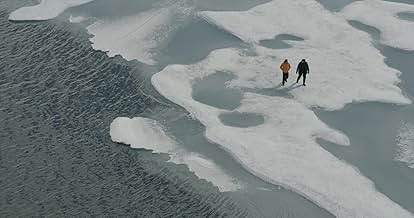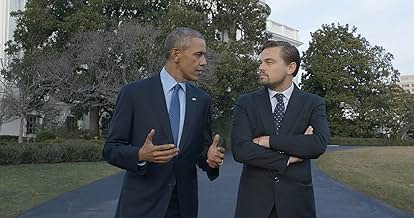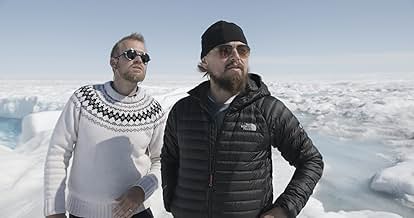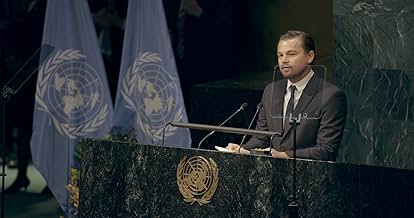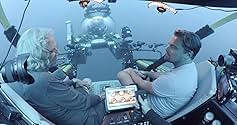AVALIAÇÃO DA IMDb
8,2/10
29 mil
SUA AVALIAÇÃO
Um olhar sobre como as mudanças climáticas afetam nosso meio ambiente e o que a sociedade pode fazer para prevenir o declínio de espécies ameaçadas, ecossistemas e comunidades nativas em tod... Ler tudoUm olhar sobre como as mudanças climáticas afetam nosso meio ambiente e o que a sociedade pode fazer para prevenir o declínio de espécies ameaçadas, ecossistemas e comunidades nativas em todo o planeta.Um olhar sobre como as mudanças climáticas afetam nosso meio ambiente e o que a sociedade pode fazer para prevenir o declínio de espécies ameaçadas, ecossistemas e comunidades nativas em todo o planeta.
- Prêmios
- 2 vitórias e 8 indicações no total
Ban Ki-moon
- Self
- (as Ban Ki-Moon)
Mike Brune
- Self
- (as Michael Brune)
Enric Sala
- Self
- (as Dr. Enric Sala)
Michael E. Mann
- Self
- (as Dr. Michael E. Mann)
Tommy Remengesau
- Self
- (as H.E. Tommy E. Remengesau Jr.)
Avaliações em destaque
I give such an evaluation of the film because of its potency to make people humble and make them think more than usual. Notwithstanding the possibility of pure propaganda in the service of one's interests, any film of this kind can not be deprived of valor because it is showing how important it is protecting nature - our home, and shows us that with our everyday choices and decisions we influence globally to everyone and everything else.
Thanks to movies like this one the stereotypes are becoming more clear. It shows how they are exposed and visible especially for the life in the cities. Instead of paving new paths people prefer to go with the flow. Without improving the consequences of their actions, people do not even think about them. They hardly link the environment and the interests of large corporations.
For the first time the viewer is provided with new data and is shown of the precise consequences that will occur in the earliest stages of global warming. Which, by the way, has already begun. Let's hope that the colonization of Mars will lead to a second leap in human development since the discovery of America and will point the right direction for it.
Perhaps one of the most essential films of DiCaprio. Last but not least, seeing Leonardo playing himself is also an interesting moment of the film.
National Geographic comes as a guarantee of the quality of the film strip which is presenting lots of beautiful natural sceneries.
My blog: http://vihrenmitevmovies.blogspot.bg/
Thanks to movies like this one the stereotypes are becoming more clear. It shows how they are exposed and visible especially for the life in the cities. Instead of paving new paths people prefer to go with the flow. Without improving the consequences of their actions, people do not even think about them. They hardly link the environment and the interests of large corporations.
For the first time the viewer is provided with new data and is shown of the precise consequences that will occur in the earliest stages of global warming. Which, by the way, has already begun. Let's hope that the colonization of Mars will lead to a second leap in human development since the discovery of America and will point the right direction for it.
Perhaps one of the most essential films of DiCaprio. Last but not least, seeing Leonardo playing himself is also an interesting moment of the film.
National Geographic comes as a guarantee of the quality of the film strip which is presenting lots of beautiful natural sceneries.
My blog: http://vihrenmitevmovies.blogspot.bg/
Being the objective of this documentary to raise awareness and support DiCaprio's activity as a "UN messenger of peace" and environmental activist, I believe it really achieved its goal as it is truly a breathtaking, eye-opening film which urges the viewer to strive for a change.
Throughout the documentary we are presented with shocking information, images and educated people's opinion on the matter (like world leaders and scientists) which adds credibility to it. Leonardo DiCaprio and his team do not spare criticism on some of the biggest countries (like the US) policies and on the fossil fuel industry.
Leo's charisma and ability to persuade and entertain the public allied to his drive as an environmental activist just leaves you glued to your seat thinking what can you do to make a change. I believe this really is the kind of information that should be more out there and DiCaprio's celebrity-status, as well as all the other people interviewed, is great for visibility.
If anything, I just wish this was a mini-series to know even more about this issue the world is facing, which might just be the biggest one it ever did...
Throughout the documentary we are presented with shocking information, images and educated people's opinion on the matter (like world leaders and scientists) which adds credibility to it. Leonardo DiCaprio and his team do not spare criticism on some of the biggest countries (like the US) policies and on the fossil fuel industry.
Leo's charisma and ability to persuade and entertain the public allied to his drive as an environmental activist just leaves you glued to your seat thinking what can you do to make a change. I believe this really is the kind of information that should be more out there and DiCaprio's celebrity-status, as well as all the other people interviewed, is great for visibility.
If anything, I just wish this was a mini-series to know even more about this issue the world is facing, which might just be the biggest one it ever did...
A well laid out doc by Leo DiCaprio and Fisher Stevens about the world we are facing today.
From the moment the movie opens we get a little glimpse at Leo's life as he talks about a Bosh painting that his father hung on the top of his crib, that started his passion for environmental issues. From then on, we realize that his documentary is not just for us it was for him as well.
Leo does not try to make himself out as an environmental expert. This is something I admire greatly about the documentary. A lot of us are being influenced on both sides of the argument about the climate change, and when Leo became the UN Ambassador of peace for this topic, he knew he needed to study up on the process, so he did it with Before the Flood. Leo travels all over the world to discover just how bad the problem actually is and what we can do to stop it.
But this doc is all about informing. Leo does not pretend to have the answers by a long shot. One of my fav parts of this movie was a discussion Leo has with an environmentalist from India whose calling out the United States for their part in Global Warming. Leo never defends his home country only comes clean about how realistic or unrealistic it is for America to go clean.
There was this one part of the film where Leo meets with his agricultural guy telling me that America needs to change it's diet. Pretty much telling me that I need to stop buying things like Doritos, which is a small part of a big picture, and by odd coincidence, I just happen to have a big bag of cool ranch in my lap. Granted, it would not hurt my waist line to give up the nachos, but there are other food products that poor Americans like myself would starve if they suddenly disappeared. Proving that this environmental issue for me anyway is not a black and white issue.
Leo created something that does what a documentary is suppose to do. His agenda was to inform you about the climate change and that's what he does, and he does it without having to make anyone look evil (well not too evil anyway). it's all about laying out the facts and seeing what we can do with that info.
Much respect.
From the moment the movie opens we get a little glimpse at Leo's life as he talks about a Bosh painting that his father hung on the top of his crib, that started his passion for environmental issues. From then on, we realize that his documentary is not just for us it was for him as well.
Leo does not try to make himself out as an environmental expert. This is something I admire greatly about the documentary. A lot of us are being influenced on both sides of the argument about the climate change, and when Leo became the UN Ambassador of peace for this topic, he knew he needed to study up on the process, so he did it with Before the Flood. Leo travels all over the world to discover just how bad the problem actually is and what we can do to stop it.
But this doc is all about informing. Leo does not pretend to have the answers by a long shot. One of my fav parts of this movie was a discussion Leo has with an environmentalist from India whose calling out the United States for their part in Global Warming. Leo never defends his home country only comes clean about how realistic or unrealistic it is for America to go clean.
There was this one part of the film where Leo meets with his agricultural guy telling me that America needs to change it's diet. Pretty much telling me that I need to stop buying things like Doritos, which is a small part of a big picture, and by odd coincidence, I just happen to have a big bag of cool ranch in my lap. Granted, it would not hurt my waist line to give up the nachos, but there are other food products that poor Americans like myself would starve if they suddenly disappeared. Proving that this environmental issue for me anyway is not a black and white issue.
Leo created something that does what a documentary is suppose to do. His agenda was to inform you about the climate change and that's what he does, and he does it without having to make anyone look evil (well not too evil anyway). it's all about laying out the facts and seeing what we can do with that info.
Much respect.
Greetings again from the darkness. Ten years ago Al Gore became a climate-change icon thanks to the Oscar-winning documentary An Convenient Truth (from director Davis Guggenheim). With this updated warning, the climate change crown is passed to Leonardo DiCaprio, and rather than just speak to the topic, he takes us on a worldwide journey to show us the effects.
The film is bookended by DiCaprio's speech to the UN general assembly after he was named UN Messenger of Peace on Climate Change. It's a reminder that the mega movie star has long been an environmental activist and yes, before you scoff, he does acknowledge that his carbon footprint is probably larger than ours (an obvious understatement – unless you also travel by yacht and private jets, and own multiple mansions).
DiCaprio's personal story about Bosch's "The Garden of Earthly Delights" hanging above his crib (seriously, how many parents think this is acceptable artwork for a toddler?) acts as a visual to his message that we are on the path of virtual destruction to the earth that we now know.
The power of celebrity in on full display as DiCaprio scores interviews with such luminaries as UN Secretary General Ban Ki-moon, President Obama, Elon Musk, John Kerry, and even Pope Francis. There is also a clip of his long-ago interview with then President Clinton (Bill, not Hillary). However, it's not the talking heads that have the most impact here. Rather, it's the first-hand look at the Canadian Arctic, the disappearing glaciers of Greenland, the sunny day street flooding in Miami, the destruction of Indonesian Rain Forest to capitalize on the palm oil market, and the eroding coral reefs. The film plays like a Tim Burton Travel Channel series each stop more nightmarish than the previous.
His passion is obvious, though his knowledge less so. DiCaprio understands the power his celebrity brings, and he joins with director Fisher Stevens (known mostly for his acting, but also an Oscar winning director for The Cove, 2009) in this attempt to bring the urgent message to the masses. As they state, we are beyond simply changing lightbulbs, and the key is a shift from fossil fuels to renewable energy a shift that China (not the U.S.) has taken seriously.
With generic solutions like "consume less" and "vote better", the film mostly avoids controversy though it does acknowledge the slick and well-funded 'campaign of denial' by those who profit mightily from a fossil-fuel dependent world. We see an impressive map/video screen tracking ocean currents, temperatures, etc. and there is a chart comparing electricity usage by U.S. citizens vs other countries (we are energy hogs, in case you weren't sure). The ending message hasn't changed much in the past 10 years "It is all up to us".
The film is bookended by DiCaprio's speech to the UN general assembly after he was named UN Messenger of Peace on Climate Change. It's a reminder that the mega movie star has long been an environmental activist and yes, before you scoff, he does acknowledge that his carbon footprint is probably larger than ours (an obvious understatement – unless you also travel by yacht and private jets, and own multiple mansions).
DiCaprio's personal story about Bosch's "The Garden of Earthly Delights" hanging above his crib (seriously, how many parents think this is acceptable artwork for a toddler?) acts as a visual to his message that we are on the path of virtual destruction to the earth that we now know.
The power of celebrity in on full display as DiCaprio scores interviews with such luminaries as UN Secretary General Ban Ki-moon, President Obama, Elon Musk, John Kerry, and even Pope Francis. There is also a clip of his long-ago interview with then President Clinton (Bill, not Hillary). However, it's not the talking heads that have the most impact here. Rather, it's the first-hand look at the Canadian Arctic, the disappearing glaciers of Greenland, the sunny day street flooding in Miami, the destruction of Indonesian Rain Forest to capitalize on the palm oil market, and the eroding coral reefs. The film plays like a Tim Burton Travel Channel series each stop more nightmarish than the previous.
His passion is obvious, though his knowledge less so. DiCaprio understands the power his celebrity brings, and he joins with director Fisher Stevens (known mostly for his acting, but also an Oscar winning director for The Cove, 2009) in this attempt to bring the urgent message to the masses. As they state, we are beyond simply changing lightbulbs, and the key is a shift from fossil fuels to renewable energy a shift that China (not the U.S.) has taken seriously.
With generic solutions like "consume less" and "vote better", the film mostly avoids controversy though it does acknowledge the slick and well-funded 'campaign of denial' by those who profit mightily from a fossil-fuel dependent world. We see an impressive map/video screen tracking ocean currents, temperatures, etc. and there is a chart comparing electricity usage by U.S. citizens vs other countries (we are energy hogs, in case you weren't sure). The ending message hasn't changed much in the past 10 years "It is all up to us".
I am glad that this documentary was made, even though I felt it was talking to someone other than me. The movie is focused on America (even though what it preaches is relevant all over the world), and much of the information is not really ground breaking if you are already concerned about the environment. I am not complaining about this, as that is probably the best target audience to try to reach for a documentary like this. There's no reason to make more documentaries preaching to the choir.
The documentary itself is mostly well made. Leonardo travels from one place to the other, and talks with some big names. Some of it feels kind of irrelevant, and the best parts is when Leonardo talks with people who are not that famous, especially the one subject that shows her frustration. Some of the places he travels are interesting to see, though it's mostly quick visits, and at times they feel more like backdrops than important set pieces. Despite the documentary jumping from one theme to the next, it holds together quite well, and Leonardo's journey functions well as a mean to take the viewer through all the information.
Personally I would have liked a documentary that was a bit more science heavy, maybe like a combination of the nature trips that Leonardo goes on here, and the presentation from Al Gore's film. But I can understand why they went in the direction they went here, and I hope it resonates with a lot of people that have not thought much about this.
The documentary itself is mostly well made. Leonardo travels from one place to the other, and talks with some big names. Some of it feels kind of irrelevant, and the best parts is when Leonardo talks with people who are not that famous, especially the one subject that shows her frustration. Some of the places he travels are interesting to see, though it's mostly quick visits, and at times they feel more like backdrops than important set pieces. Despite the documentary jumping from one theme to the next, it holds together quite well, and Leonardo's journey functions well as a mean to take the viewer through all the information.
Personally I would have liked a documentary that was a bit more science heavy, maybe like a combination of the nature trips that Leonardo goes on here, and the presentation from Al Gore's film. But I can understand why they went in the direction they went here, and I hope it resonates with a lot of people that have not thought much about this.
Você sabia?
- CuriosidadesReleased for free on the National Geographic YouTube channel.
- Citações
Leonardo DiCaprio: You are the last best hope of Earth. We ask you to protect it or we, and all living things we cherish, are history.
- ConexõesFeatured in Docventures: Ilmastonmuutos (2017)
- Trilhas sonorasBefore the Flood
Composed by Trent Reznor & Atticus Ross, with Gustavo Santaolalla
Principais escolhas
Faça login para avaliar e ver a lista de recomendações personalizadas
- How long is Before the Flood?Fornecido pela Alexa
Detalhes
- Data de lançamento
- País de origem
- Idioma
- Também conhecido como
- Before the Flood
- Locações de filme
- Ushuaia, Tierra del Fuego, Argentina(Filmed in)
- Empresas de produção
- Consulte mais créditos da empresa na IMDbPro
Bilheteria
- Faturamento bruto mundial
- US$ 988
- Tempo de duração
- 1 h 36 min(96 min)
- Cor
- Proporção
- 1.78 : 1
Contribua para esta página
Sugerir uma alteração ou adicionar conteúdo ausente


